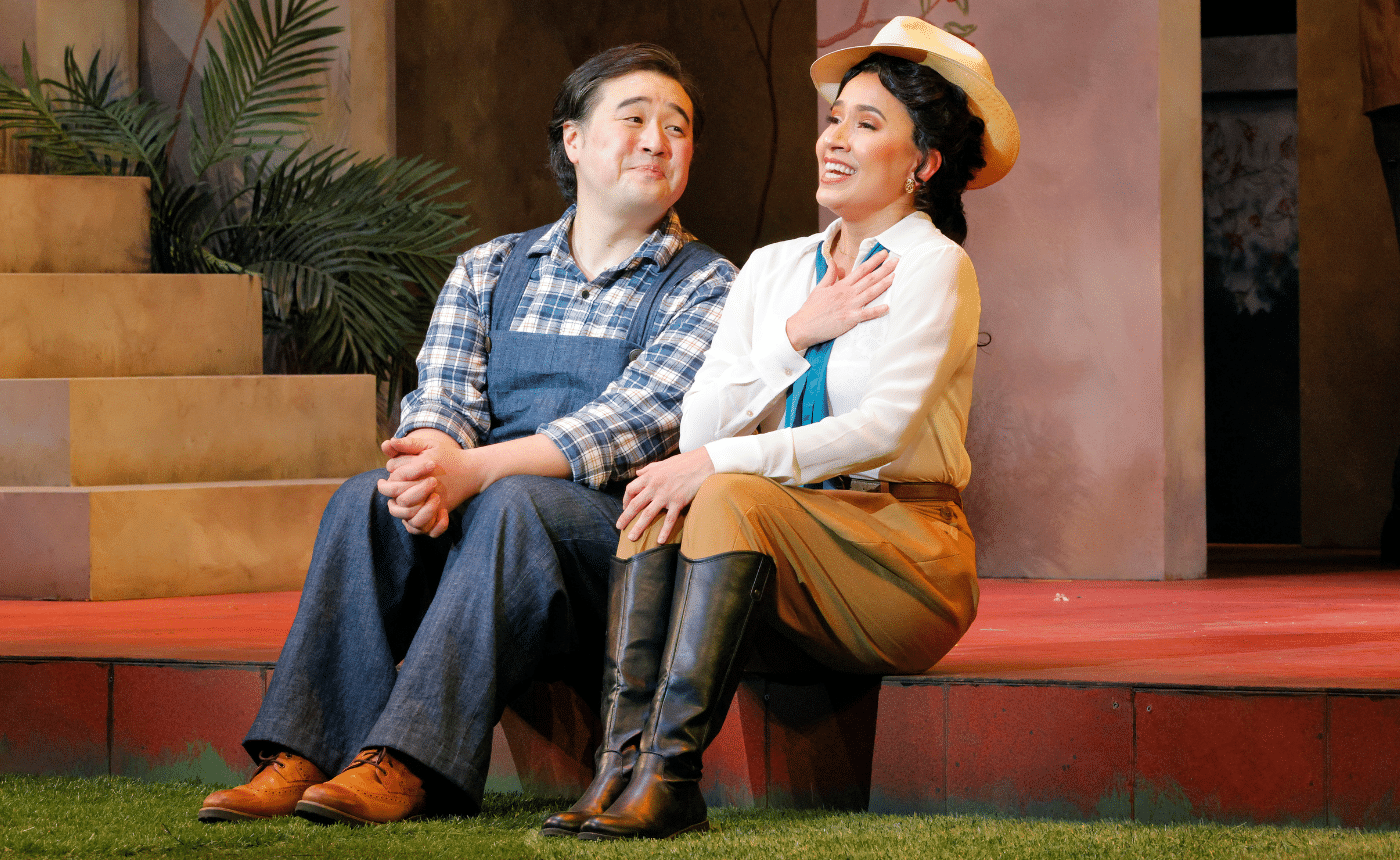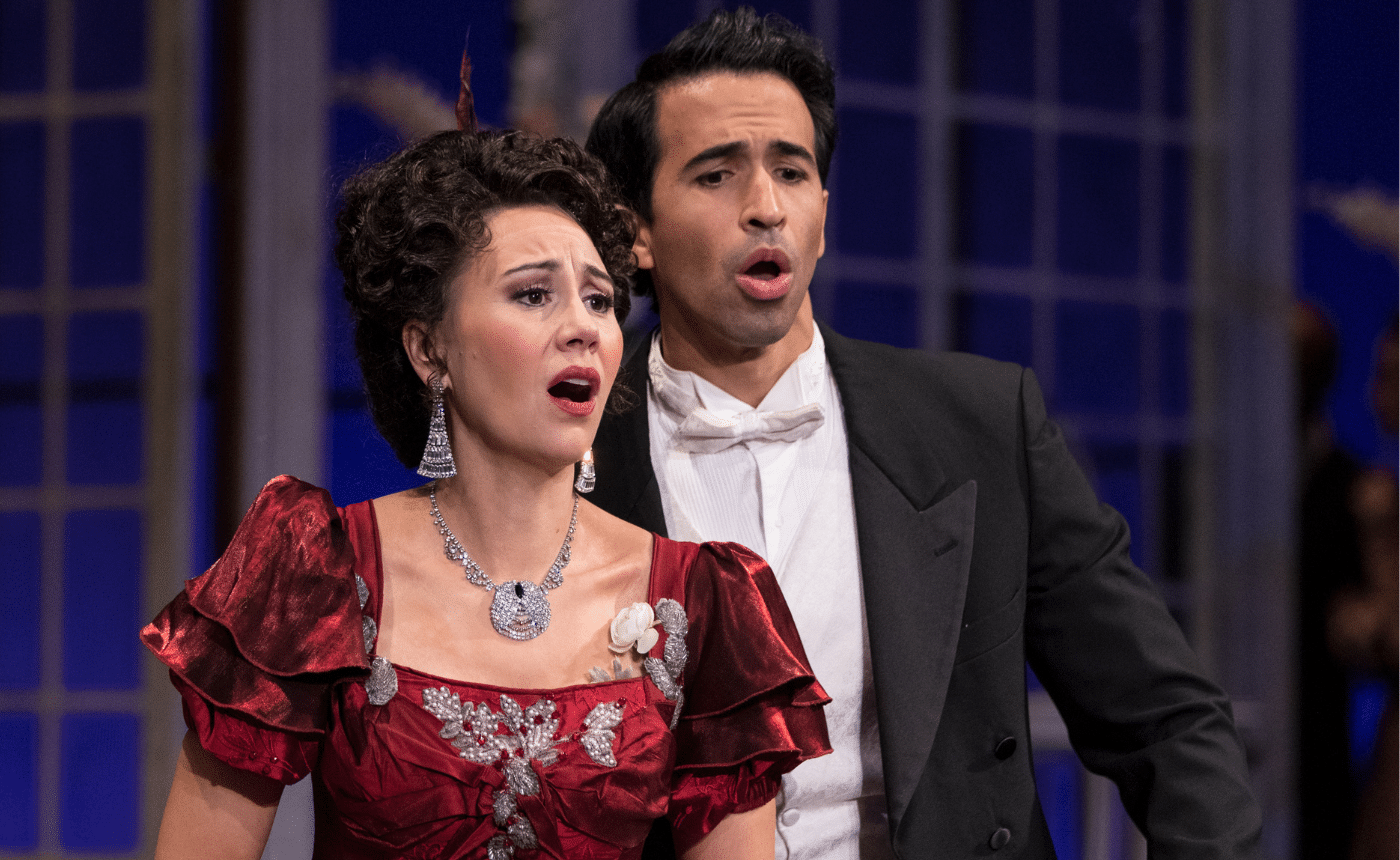Silent Night Online Course by Dr. Ross HagenPart 4: Music and Plot of Silent Night – Act I
In order to convey the story of the Christmas Truce, Silent Night takes a musically and linguistically polyglot approach. The opera is sung in English, German, and French (with a bit of Latin) in order to take into account the home languages of the characters. Silent Night also contains instances of “diagetic music” or “source music,” which refers to music that is a part of the setting of the drama. Given that the opera is based on a film, this makes sense, as films typically contain scenes with diagetic music, along with the underscore that accompanies the action without being part of it. Puts is then tasked with composing not only his own operatic score, but also including Mozartean opera, patriotic songs, Scottish bagpipes, an onstage string-quartet, sentimental songs, and Christmas carols. Although I can’t say with 100% certainty, these diagetic pieces appear to be original to Puts’ score, or at least if they were borrowed from somewhere I wasn’t able to locate them. In addition to the division between diagetic music and underscore, the opera’s cinematic origins will also become apparent in the quick cuts and overlapping scenes between different sets of characters. Over the course of the opera, we will see that the stories of the three groups of Scottish, French, and German soldiers begin separately, converge on the battlefield, and then separate again, so the overlapping sections and quick cuts also make dramatic sense. Going forward, I will refer to timestamps from this site in case you would like to hear those moments specifically:
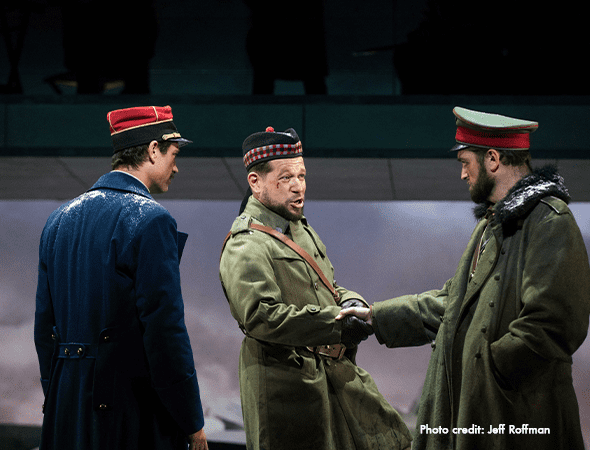
Atlanta Opera production of Silent Night
Act I – Prologue
The prologue demonstrates this kind of “cinematic” approach. It opens with the opera singers Nikolaus and Anna performing an Italian duet very much in the style of Mozart until a German general walks onto the stage and signals for the orchestra to stop in order to read the declaration of war. It is a striking beginning, because at the beginning of the opera the audience and orchestra are momentarily a part of the opera’s fictional world; we are the audience and orchestra within the opera as well. As the general continues reading, the orchestra shifts to its role providing a tense underscore, while an offstage chorus begins singing a German war song called “Der Sieg Wird Unser,” or “The Victory will be Ours.” As I noted, it doesn’t appear to be a real German war song, although my searching did uncover a Nazi poster from World War II with the text “Der Sieg Wird Unser Sein” that was possibly the inspiration. We also meet the priest Palmer, who will be a chaplain in the war.
Act I, Scene 1
The opera then shifts to Scotland, introducing the brothers William and Jonathan. William dreams of heroism, repeatedly singing the phrase “the glory of battle,” which Puts emphasizes by setting “glory” and “battle” on high, sustained notes, with the first three repetitions climbing progressively higher in pitch (3:58).
William demands that his brother enlist with him, and then an offstage chorus begins a British war song entitled “Never Turn Your Back on the Union Jack.” In the score, there is a brief mention that the voices singing the song are explicitly British and not Scottish, possibly noting that it was the whole of the UK at war and not just Scotland.
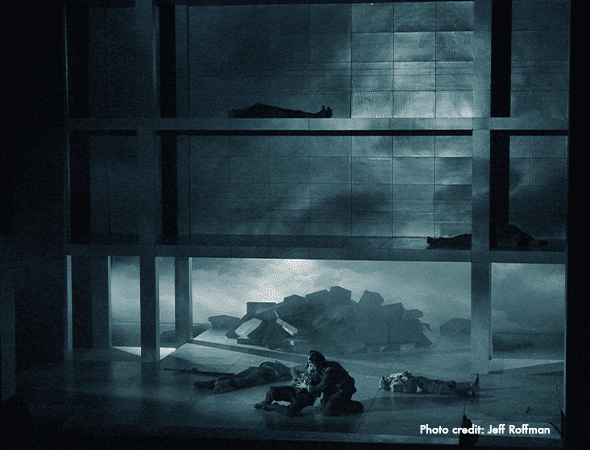
Atlanta Opera production of Silent Night
The scene then shifts to Paris, where we are introduced to Lieutenant Audebert and his pregnant wife Madeline (5:05). Madeline is understandably upset that Audebert has been called up and he tries to console her that the war will last only a few weeks. As with the other two scenes, they are eventually joined by an offstage chorus singing a French song named “Nous Nous Battons” (“We Fight”).
There is something undeniably cinematic about how Puts deals with the opera’s exposition using these sorts of quick jumps to parallel scenes in different locations. The opera then overlays all of the characters, beginning with Jonathan and William (6:05) and growing to include Palmer, Nikolaus, and Audebert. Eventually the war songs are overlaid on top of the soloists as well and it all begins to reach a sort of critical mass, resembling more than anything (to my ear, anyway) some of the dense orchestral collages of the American composer Charles Ives. As the soloists finish and the three war songs continue on, the sound of an incoming bomb is heard and there is a massive explosion, which ushers in a relentless battle scene.
For this initial battle scene, the stage is split into three areas: the German bunker on one side and the French and Scottish on the other, with no-man’s land in the middle. Puts’ music for this battle scene is appropriately apocalyptic in nature. (7:30) Amidst the bomb blasts, machine guns, and screams he includes screeching strings and violent low brass and percussion, clearly drawing on the musical vocabularies of war pieces like Penderecki’s Threnody to the Victims of Hiroshima and George Crumb’s Black Angels in order to depict the horror and intensity of battle. At around 11:00, William runs across the no-man’s land and is shot. Jonathan tries to carry him across but William urges him to leave and save himself before going limp, and Jonathan runs back to the Scottish bunker. When the smoke clears there are 8 or 9 bodies on the stage.
Act II, Scene 2
The second scene (12:00) is ushered in by almost Debussyian chords, nocturnally meditative and repetitive, as the men nurse their wounds in their respective bunkers and count their casualties. Jonathan mourns his brother and swears that he is going to kill every last one of the Germans. At the French bunker, Audebert is getting reports of the dead and wounded, and when he returns to his “office,” he finds that a general is waiting for him(14:54). At this point Puts introduces a new musical idea in the flutes, a vaguely Stravinsky-ish rhythmic motif that oscillates between notes almost like a birdsong. This motif will return later in Act II, with the general. The general registers his disappointment with their attack that day, and Audebert tries to change the subject by asking the general is there has been news of his wife. The general says they haven’t been able to get any information, and that he assumes that Madeline is at her parents’ house. Finally, the general tells Audebert that he is being transferred to artillery, noting that he’s been a disappointment.
Audebert’s attendant Ponchel then enters with coffee, and Audebert realizes to his distress that he’s lost his wallet, which had a photo of his wife. (19:00) After Ponchel leaves, Audebert begins listing the dead. Puts sets his aria over a harp ostinato that repeats the notes C#-E-F# over and over like a mantra, its “stuck” feeling and minor tonality emphasizing Audebert’s hopelessness and pointlessness. Audebert then begins addressing Madeline, and Puts shifts the key to the relative major E as Audebert tells her about losing the photo, creating a sudden brightness in the music (20:36). The harp continues repeating a rising three-note ostinato in the new key. Over the course of the aria he goes back to listing a couple of times, and the music likewise reverts to C# minor each time, only to return to E major again when Audebert’s thoughts return to Madeline. He imagines her with their baby, singing it to sleep, and then realizes that he also needs sleep.
The harp ostinato continues into the next scene, in which snow begins to fall and the soldiers all sing their own songs of sleep and remembering their loved ones. (23:00) The harp ostinato which seemed to reference the lethal futility of war in the beginning is now transformed into a representation of the comforts of memory, not just for Audebert but for all of the soldiers. The music grows increasingly lush as Puts ultimately has three choirs going at once each singing on their own and (of course) in their own language. At 24:00 the accompaniment stops and the choirs split in twain, so that each set of soldiers is singing two lines, creating a strikingly gorgeous section of six-voice counterpoint in three different languages.
The focus then turns to Nikolaus, who is alone in the German bunker and begins addressing Anna, stating that he cannot go back to his life as it was before, ending with “Alles ist nutzlos. Alles: Die Oper. Der Gesang. Nutzlos.” (“Everything is useless. All of it. Opera. Singing. Useless.”) In a war film, a scene like this would be almost expected for an artistic character like Nikolaus, but here this moment becomes incredibly “meta.” This might be the only opera in which an opera singer character sings about singing. But it also brings this historically-focused opera squarely into the present moment, and makes the audience complicit in his assertion that opera and singing are useless in the face of war. After all, Americans have all been living in a time of war for nearly a generation, yet here we are at the opera.
Act I, Scene 3
The following scene opens on the next morning (27:00), with music that evokes dawn as the lights slowly come up. It begins with a rising line in the strings and harps that is gradually augmented by fast rippling flutes. The music here recalls a few other famous moments of “dawning” music, such as the beginnings of Haydn’s oratorio The Creation or Aaron Copland’s Appalachian Spring, but more dissonant. The music then takes on more activity, with a brief figure of imitative counterpoint that introduces the German soldiers unpacking Christmas trees, which the German Lt. Horstmeyer considers utterly ridiculous when they could really use more men or guns. When he mentions the trees’ tinsel at 28:40, the music briefly becomes celebratory in nature, including Christmas-y bells, as a way to underscore the irony of delivering Christmas trees to a warzone. Horstmeyer then calls Nikolaus over and informs him that he has been requested to sing at a party that night by the Crown Prince, and that Anna will be there as well. An alarm clock goes off in the French trenches and Horstmeyer notes that it goes off every day at 10am.
The focus then turns to the French troops, who are unpacking wine, cognac, champagne, and chocolate. (31:37) Audebert gets a haircut from his attendant Ponchel, who then indulges in a bit of a reverie remembering having coffee with his mother, accompanied by similarly dreamy music. Puts then turns to the Scottish bunker in which Jonathan is writing to his mother, thanking her for a package she had sent, and neglecting to mention William’s death. Meanwhile, Palmer is unloading crates of whiskey.
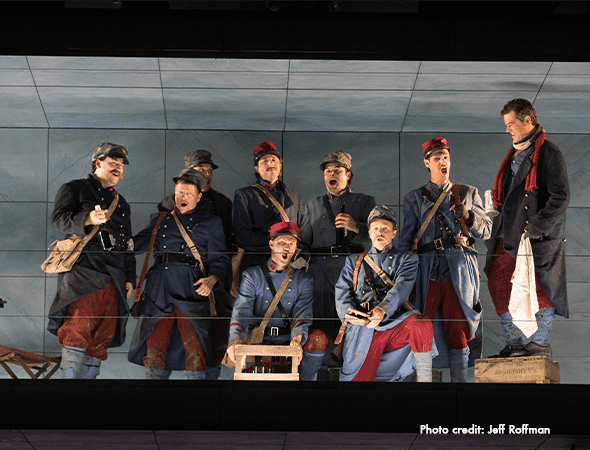
Atlanta Opera production of Silent Night
Act I, Scene 4
Following this, the music begins to grow quite dissonant and unstable as it leads into the next scene, following the way that music in films often serves to smooth the transitions between time and space that are a regular part of cinema. A representation of a chalet appears in no-man’s land, along with a chandelier, Christmas tree, waiters, and a string quartet. The music picks up in media res with Nikolaus and Anna finishing the last phrases of the Mozartean duet that began the opera, accompanied here by the on-stage string quartet (38:47). After they finish they are applauded by the Kronprinz, who we can assume is based on (if not outright intended to be) Crown Prince Wilhelm, the last Crown Prince of the German Empire and the Kingdom of Prussia, and also the commander of the German 5th Army. Nikolaus is bristling at the situation and in order to head off arguments, Anna suggests an encore and after a false start they sing a German tune entitled “Komm, Frühling!” (“Come, Spring!”), a pastoral lied that on the one hand feels like a genuine plea for the end of the war and on the other is so maudlin that it serves to underscore the disconnect between the soldiers in the trenches and the audience for Nikolaus and Anna’s performance.
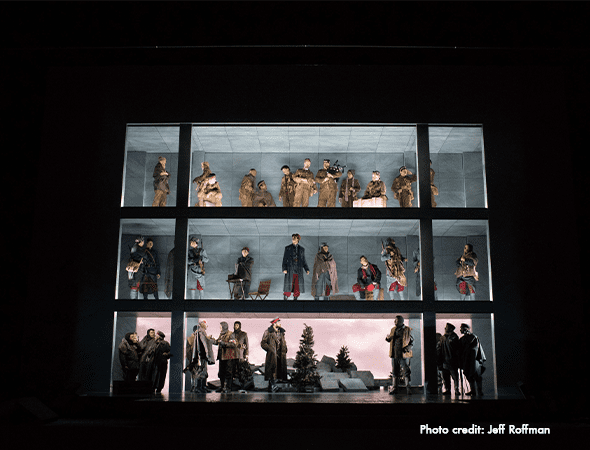
Atlanta Opera production of Silent Night
The string quartet continues playing their light dinner music briefly as Anna and Nikolaus step out onto an outside terrace, at which point it stops (43:40). They recount their first meeting, and while Anna suggests a rendezvous in her room after the party ends, Nikolaus declares that he has to return to his comrades in the trenches. Anna, understandably upset, lists everything she had to do in order to arrange the concert, and Puts’ music at times almost begins echoing Schoenberg’s famous Pierrot Lunaire and other modernist works, particularly in the chromatic and dissonant accompaniment and the big jumps in the vocal melody. As Anna notes repeatedly that she has waited for this moment constantly since he left, Puts sets the repeated word “Augenblick” (literally “eyeblink,” but here “moment” or “minute”) with a descending three-note figure. It is never exactly the same in rhythm and pitch, but this varied repetition serves to highlight that word. Anna then declares that if he goes back she is coming with him, and any protest would be futile because she has papers of passage.
The scene ends with a musical “fadeout” on their duet that moves us back to the waltz being played by the string quartet inside. This music is then overwhelmed by the somber music from the orchestra, feeling a little like a musical equivalent to a cinematic “wipe” cut that takes us back to the bunkers. (50:20)
The Scots are drinking and one of them walks in with a bagpipe and begins playing a “sentimental song of the day” (as noted in the score) called “My Home’s Never Far Away,” and the chaplain Palmer joins in with the words. As with the other instances of diagetic music in the opera, this song also appears to be original, with Puts pulling off a convincing simulacrum of numerous early 20th-century popular songs. As Palmer finishes, the soldiers in the other bunkers appear either moved or suspicious, but there is a rousing cheer, at which point the Scottish soldiers sing it again.
At this point, Nikolaus and Anna arrive, and Nikolaus decides to join in (or perhaps issue a singing challenge), and sings a German carol accompanied by a soldier on a harmonica. (54:45) By the end, the Scottish bagpiper has picked up the tune and joined in. Throughout, the French attendant Ponchel is complaining of how awful it all sounds, noting that he prefers bombs. Nikolaus sings the carol again, this time accompanied throughout by the bagpiper, and by the end of the song Nikolaus stands on top of the bunker.
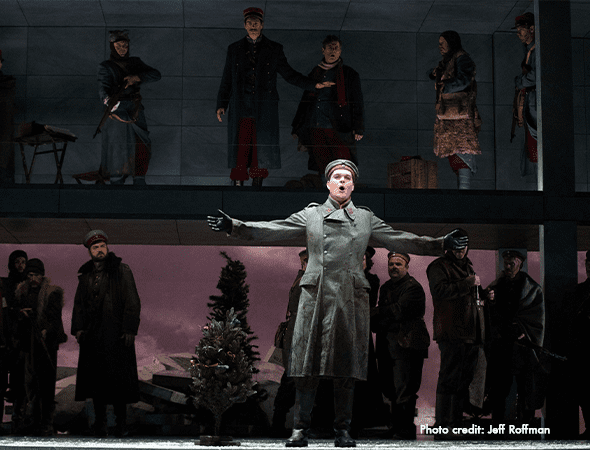
Atlanta Opera production of Silent Night
A French sentry almost takes him out but is ordered to stand down. Nikolaus begins a Latin Christmas carol and the bagpiper also stands on the bunker, followed by more French and Scottish soldiers, as the orchestra begins to progressively layer more dissonance over the top of the scene (57:00). Eventually, the three commanders, Audebert, Horstmayer, and the British lieutenant Gordon come to the center under white flags and agree to a ceasefire for Christmas. The music grows tense as the soldiers begin to gather in no-man’s land, but the stress is broken when the French attendant Ponchel offers a chocolate.
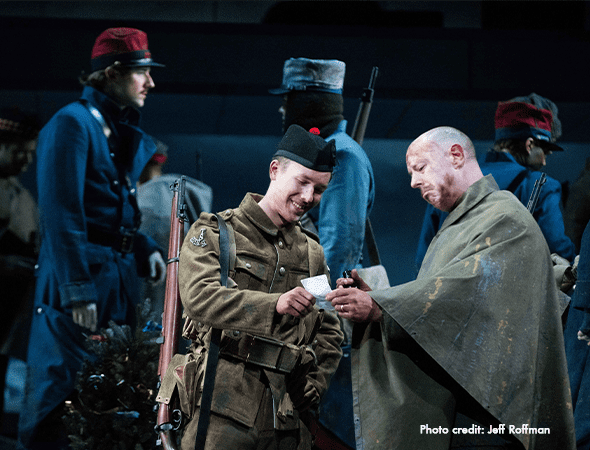
Atlanta Opera production of Silent Night
As the men begin to mix and converse, Nikolaus fetches Anna from the trenches to join them, and Palmer finds a bell and begins to intone a service. As Nikolaus and Anna converse with the commanders, Jonathan seethes about William’s death (1:05:42), musically echoing his “glory of battle” speech from the beginning of the opera, with his oaths of revenge providing a starkly ironic contrast to Palmer’s service and Anna’s beginning of “Dona Nobis Pacem” (“Grant Us Peace”). To underscore that, Palmer’s closing of the service with “Ite in pace” is answered by distant explosions and tense music to end the first act.
https://www.youtube.com/watch?v=n1CkWB1J8ac



